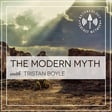
Heritage Traineeships with Phoenix Archer - Episode 16 - Modern Myth
It is always important to be open to hearing both when things go well and also when there are serious issues. In the UK, there is a feeling that systemic racism is either overemphasised or poses no real threat. However this ignorance leads to those who experience racism having to be suffer and work harder in order to have a normal life or employment.
In this conversation I am speaking to Phoenix Archer who gained a certification in Conservation with Historic Environment Scotland, a traineeship facilitated by the Next Step Initiative. Next Step provide opportunities for BAME individuals for traineeships and training in Scotland.
Phoenix tells me about her experiences at HES, based at the Engine Shed in Stirling, Scotland. She tells me about the difficulties of moving to a new city, living in a hostel before find accommodation as well as experiencing harassment at work. Despite writing letters to her managers, and making it known that she felt uncomfortable, it all seemed to fall on deaf ears.
Phoenix works for several organisations, including St Machar's Cathedral in Aberdeen, Ahead of the Game - Application and CV services and new in October BIPOC and them some, which seeks to highlight BIPOC representation in arts and Media.
https://www.facebook.com/AOTGTheReal/
https://www.facebook.com/ProgressinDialogue/
https://www.stmachar.com/education_outreach.htm
https://www.facebook.com/BIPOC-and-then-some-115065223670327
